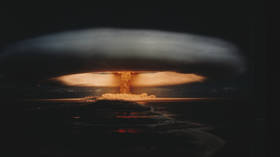Russia responds to ‘nuclear human shield’ claims
Washington accused Moscow of using Ukrainian nuclear power plant as a ‘military base’
The Russian mission to the United Nations has rejected claims by the US Secretary of State Antony Blinken, who accused Russian forces of using Ukraine’s Zaporozhye Nuclear Power Plant as a “military base” during his speech at the tenth Non-Proliferation Treaty (NPT) review conference on Monday.
Currently under the control of Russian forces, Zaporozhye NPP, located in Energodar, southeastern Ukraine, has been a target of several attempted strikes over the past months. On July 12, Ukrainian drones dropped several 120mm shells on a building located next to the power plant, injuring 11 employees, according to local authorities. On July 20 three Ukrainian “kamikaze drones” attacked the plant, with no damage to its structures reported.
After Russia sent troops into Ukraine, the power plant and its surroundings were taken under guard for the exact purpose of preventing such “nuclear provocations” with potentially “unpredictable consequences,” the Russian mission to the UN explained on Monday.
“There are no armed formations at the Zaporozhye NPP, except for a limited number of military servicemen, that is required to ensure safety and security at the power plant,” the statement said.
Moscow accused “Ukrainian nationalist formations and foreign mercenaries” of repeated attempts to sabotage the power plant and ultimately “creating a threat of a nuclear disaster,” allegedly with “full support of the United States and other Western states.”
Addressing the NPT conference on Monday, Blinken accused Russia of “using the plant as a military base to fire at Ukrainians, knowing that they can’t and won’t shoot back because they might accidentally strike a nuclear – a reactor or highly radioactive waste in storage.”
“That brings the notion of having a human shield to an entirely different and horrific level,” the top US diplomat claimed.
Russia currently controls the southern and central part of the Zaporozhye region, including the city of Energodar, where the biggest nuclear plant in Europe is situated. The administrative center of the region, Zaporozhye, remains under Ukrainian control.
Russia sent force into neighboring state on February 24, citing Kiev’s failure to implement the Minsk agreements, designed to give the regions of Donetsk and Lugansk special status within the Ukrainian state. The protocols, brokered by Germany and France, were first signed in 2014. Former Ukrainian President Pyotr Poroshenko has since admitted that Kiev’s main goal was to use the ceasefire to buy time and “create powerful armed forces.”
In February 2022, the Kremlin recognized the Donbass republics as independent states and demanded that Ukraine officially declare itself a neutral country that will never join any Western military bloc. Kiev insists the Russian offensive was completely unprovoked.






Comments are closed.